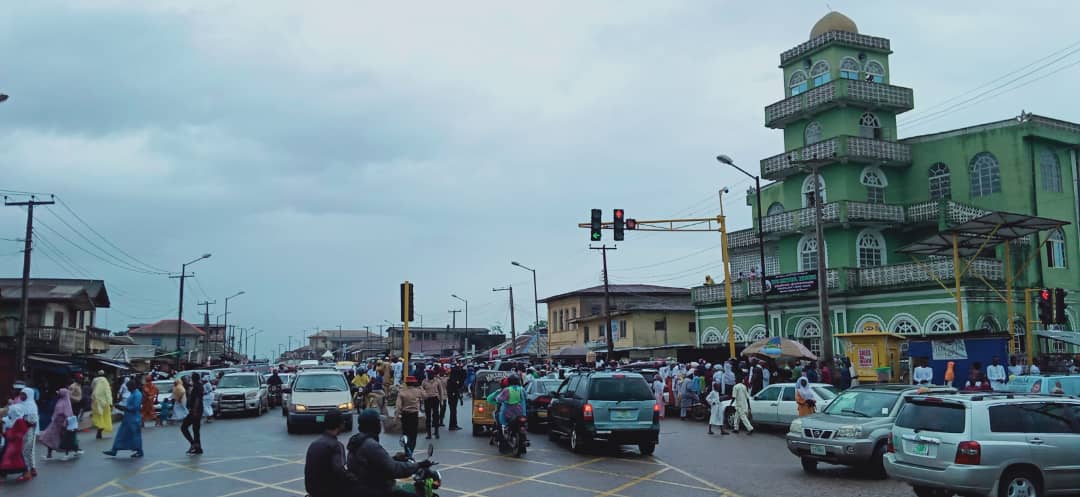- “The Ileya festival comes once in a year, and we are happy to witness today to celebrate the Eid-El-Kabir” – Otun Seriki of Epe kingdom.
By_ Babatunde Kaka & Ronny Ikpoto

Despite the threat of inclement weather and a State Government directive against densely packed worship centres, residents of Epe Division, the fish basket of Lagos, seemed undeterred in their resolve to mark this year’s Eid-El-Kabir with its characteristic verve as they thronged out en masse to the First Epe Central Mosque to observe this year’s Eid prayers.
Epe, one of the five administrative divisions of Lagos State, being predominantly Muslim in its religious inclination, celebrated the Eid with unrestrained vigour despite the many hamstrings that has threatened this year’s festivities.


Notwithstanding the hike in the price of food items in the market, which has put basic food items out of the reach of many, Muslims in Epe have celebrated Eid-al Adha today.
Eid-al Adha, Arabic for Festival of the Sacrifice, is the latter of the two official holidays celebrated by Muslims.


Muslim faithful often mark the yearly ritual with slaughtering of rams in honour of Ibrahim, who was to sacrifice his son, Ismail, as an act of obedience to God’s command. Before Ibrahim could sacrifice his son, however, Allah provided a lamb for the sacrifice.
However, the hike in price of ram has made it difficult for many, who want to observe the yearly ritual. Some of them, who spoke with Eko Hot Blog, lamented the hike in food prices, which has made it difficult for the average household to celebrate the yearly festivity.
A trader, Mrs Raphael Omolara, who spoke with our correspondent, said the closure of Nigeria’s borders has greatly affected the prices of commodities in the market, and appealed to the government to reopen the borders and lift the plight of the traders.


“There is no money for people to buy. People are managing to buy. Help us beg our government to open the borders so that market will come out, so that people can buy at cheaper prices,” she said.
A resident, Otunba Muyiwa Oladele, regretted that some of the traders were forced to come to the Market during the Eid due to the economic austerity that has gripped most homes.
“We can link this one to the economic situation of the country, people are just struggling to survive. Today they’re supposed to stay at home, being the Sallah day, but they don’t have money, children must feed. They must take care of their expenses and their bills, that’s why they have to manage the two together. Some of them have been to the mosque this morning. They’ve gone for Eid, and they’re back to the market to come and sell to make some money, so they can take care of their families.”
Muyiwa also spoke on the lack of adherence to COVID-19 preventive protocols at the mosques and in the markets during this year’s Eid celebrations, noting that it is not advisable to flout the recommendations of health experts, especially in view of the Delta variant of the coronavirus that has been detected in Nigeria.
“It is not advisable. We have to observe the COVID-19 protocols, because the Delta variant is here in the country. So we have to be very careful, and the thing is spreading at a fast rate. The Governor told us last week that the isolation centres are filled up. So we have to be very careful and restrict movement as much as possible.”
Another trader, Mrs Hassan, cited the present economic crunch as the reason behind her coming to the market during the Eid.
“There is no money. I need money to take care of my children that will be going back to school. That is why I came to the market today.”
Reacting to the exponential inflation of food prices, Mrs Hassan cited the unceasing rift between the Southerners and Northerners who are largely responsible for food production in the country.
“We don’t know, but meat and pepper are too costly in the market. Maybe its because of the Fulani that they’re fighting. We don’t know, but they’re too costly.
High Chief Kadiri Odedeogboro, Secretary, Olu-Epe-in-Council and Otun Seriki of Epe kingdom, who also spoke with our correspondent, expressed gratitude for the grace to witness another Eid.

“The Ileya festival comes once in a year, and we are happy to witness today to celebrate the Eid-El-Kabir, a day when all Muslims all over the world celebrate the festival. In Epe, it is one of the festivals that we cherish much, being a Muslim community, so we are happy today.”
Chief Kadiri noted the significance of enlightening the people to adhere to recommended COVID-19 protocols as Lagos State battles the third wave of the coronavirus pandemic.
“We really take cognizance of the COVID protocols, because we enlighten our people that the third wave of COVID-19 is still on and we really encourage them to follow the COVID protocols.”
READ MORE:
- Eid-El-Kabir: Buhari Blames Food Inflation On Insecurity, Flooding
- Sallah: Happy Eid-El-Kabir Messages, Wishes And Quotes
The Otun Seriki of Epe kingdom also hailed the resourcefulness of the residents, whom, according to him, have made the most of the present economic difficulty to celebrate the Eid nonetheless.
“Being one of the most cherished festivals, our people don’t care much concerning the hike in the prices of ram, cow and all other things, especially the food items. Money is scarce, but we still try to manage. We implore Government to cushion the effects of this scarcity of food items, maybe by introducing price control.

The high chief also enjoined the good people of Epe to embrace peace and harmonious relations as a necessary index to the development of the division.
Advertise or Publish a Story on EkoHot Blog:
Kindly contact us at [email protected]. Breaking stories should be sent to the above email and substantiated with pictorial evidence.
Citizen journalists will receive a token as data incentive.
Call or Whatsapp: 0803 561 7233, 0703 414 5611










![We Must Desist From Spreading Myths About The Military – T.J. Abass To Lagos Youths [FULL SPEECH]](https://ekohotblog.com/wp-content/uploads/2024/11/New-Project-16-350x250.webp)




